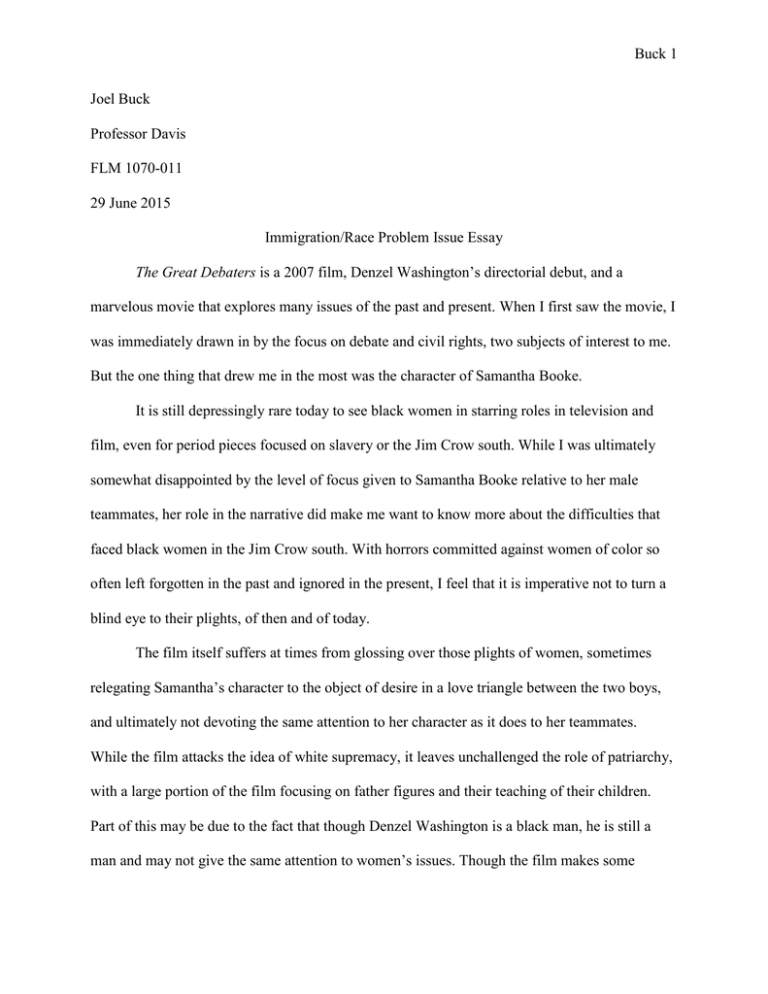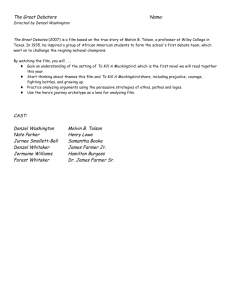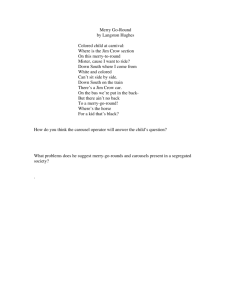
Buck 1
Joel Buck
Professor Davis
FLM 1070-011
29 June 2015
Immigration/Race Problem Issue Essay
The Great Debaters is a 2007 film, Denzel Washington’s directorial debut, and a
marvelous movie that explores many issues of the past and present. When I first saw the movie, I
was immediately drawn in by the focus on debate and civil rights, two subjects of interest to me.
But the one thing that drew me in the most was the character of Samantha Booke.
It is still depressingly rare today to see black women in starring roles in television and
film, even for period pieces focused on slavery or the Jim Crow south. While I was ultimately
somewhat disappointed by the level of focus given to Samantha Booke relative to her male
teammates, her role in the narrative did make me want to know more about the difficulties that
faced black women in the Jim Crow south. With horrors committed against women of color so
often left forgotten in the past and ignored in the present, I feel that it is imperative not to turn a
blind eye to their plights, of then and of today.
The film itself suffers at times from glossing over those plights of women, sometimes
relegating Samantha’s character to the object of desire in a love triangle between the two boys,
and ultimately not devoting the same attention to her character as it does to her teammates.
While the film attacks the idea of white supremacy, it leaves unchallenged the role of patriarchy,
with a large portion of the film focusing on father figures and their teaching of their children.
Part of this may be due to the fact that though Denzel Washington is a black man, he is still a
man and may not give the same attention to women’s issues. Though the film makes some
Buck 2
cursory appeals to the idea of Samantha breaking boundaries and having her own wants and
desires, it sorely neglects her agency in favor of her teammates’ struggles.
These issues of agency are ones that plagued many black women in the Jim Crow south,
as was the case with Recy Taylor, a 24-year-old black woman and sharecropper who was gangraped by white men in Alabama in 1944 (Gordy, “Recy Taylor.”). Recy was seen only as an
object by these white men, to be used and disposed of by them, and then left to carry that
experience for the rest of her life. To this day, there has been no justice for Recy against her
attackers, with her experience and the experience of hundreds of other black women like her left
forgotten and buried. Sexual assault of black women is still rampant today, with one study
stating that “sixty percent of Black girls have experienced some form of sexual abuse before the
age of 18.” (Axtell, “Black Women, Sexual Assault and the Art of Resistance.”) This an
appalling continuation of the state of affairs that existed back in the Jim Crow era, a state of
affairs that has been left forgotten and ignored, and one that must finally be given its dues.
Black women suffered under slavery and Jim Crow. They struggled for years under
constant terror, and it is a terror that remains to be vanquished for many. But for us to help
improve the lives of black women, it must first be acknowledged the horrors they have gone
through in the past and still go through today. We must make a greater effort to include black
women in our teachings of history, and in the arts such as film. We must strive to show not just
the horrors inflicted upon black men, but also black women. And to do that, we must start by
having Samantha Booke be her own person with her own dreams and demons to face, and not
just be an object to be fought over.
Buck 3
Works Cited
The Great Debaters. Dir. Denzel Washington. Perf. Denzel Washington, Forest Whitaker,
Denzel Whitaker, Jurnee Smollett, and Nate Parker. MGM Pictures, 2007. Film.
Gordy, Cynthia. “Recy Taylor: A Symbol of Jim Crow’s Forgotten Horror.” The Root. 9
February 2011. Web. 28 June 2015.
Axtell, Brooke. “Black Women, Sexual Assault and the Art of Resistance.” Forbes. 25 April
2012. Web. 29 June 2015.





